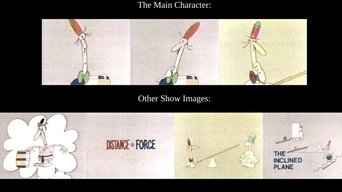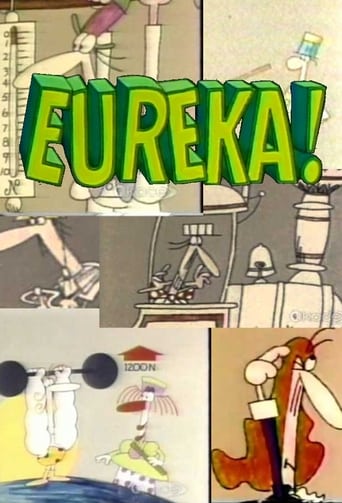Información de la Temporada
Fecha de estreno: 01 de enero, 1981
Episodios: 20
Duración de temporada: 2 horas
Última emisión: 01 de enero, 1981
Valoración media Palomitacas: ★ (0/10)
Valoración media TMDB: ★ (0.0/10)
Tráiler disponible: ver trailer de temporada
Aún no ha sido valorada por expertos en este género.
¿Dónde ver Eureka!?
Opiniones de la temporada 2
Aún no se han escrito opiniones de la temporada 2, ¡anímate a romper el hielo!
Reparto principal de la temporada 2
Episodios

Capítulo 1: Episodio 1
Fecha de estreno: 01 de enero del 1981 5 min
Sinopsis: How can someone lift a very heavy load? If one could slice the load into pieces, that would trade increased distance for decreased effort. But since one can't break things because they are so hea...

Capítulo 2: Episodio 2
Fecha de estreno: 01 de enero del 1970 5 min
Sinopsis: A teeter-totter is the perfect demonstration of the lever, particularly if you are trying to ride a teeter-totter with someone heavier than you. Such is the Principle of the Lever.

Capítulo 3: Episodio 3
Fecha de estreno: 01 de enero del 1970 5 min
Sinopsis: Two professors compete to see who can lift a book with a lesser amount of force. The professor who uses a lever is more efficient than the inclined plane, once we factor in a basic double-edged sw...

Capítulo 4: Episodio 4
Fecha de estreno: 01 de enero del 1970 5 min
Sinopsis: All machines in the world can be traced to just two: the inclined plane and the lever. Even the wheel is just a circular lever whose fulcrum has become an axle. The screw? It's just a spiraling ...

Capítulo 5: Episodio 5
Fecha de estreno: 01 de enero del 1970 5 min
Sinopsis: Jack and Jill went up the hill and found a problem: how can they pull a pail of water from the bottom of a well? In this expanded nursery story, we find there is more to a pulley–and its mechani...

Capítulo 6: Episodio 6
Fecha de estreno: 01 de enero del 1970 5 min
Sinopsis: The first of six shows on heat and temperature, introduces molecules. Even though a solid object looks motionless, its molecules move back and forth in a lattice-work dance.

Capítulo 7: Episodio 7
Fecha de estreno: 01 de enero del 1970 5 min
Sinopsis: This episode sacrifices a chocolate rabbit on a hot day to illustrate the movement of molecules in liquids.

Capítulo 8: Episodio 8
Fecha de estreno: 01 de enero del 1970 5 min
Sinopsis: No end of problems await the man who keeps fish for pets. Evaporation forces one to refill the tank. And he who thinks he can outsmart water vapor by keeping his fish in a refrigerated water tank...

Capítulo 9: Episodio 9
Fecha de estreno: 01 de enero del 1970 5 min
Sinopsis: This lecture-packed show compares a balloon to a bunch of angry wasps to explain why gases expand and contract. It goes further than that. The expansion process also affects matter when it change...

Capítulo 10: Episodio 10
Fecha de estreno: 01 de enero del 1970 5 min
Sinopsis: Given three bathtubs of varying temperature, the star of the show ""blunts"" his feet so that they can't tell temperature. Sure they can't. The human body can only tell changes in temperature in ...

Capítulo 11: Episodio 11
Fecha de estreno: 01 de enero del 1970 5 min
Sinopsis: What is better to warm up a kiddie pool: a teacup of boiling water (100° Celsius) or a bucket of water at 50° Celsius? The answer tells you the difference between temperature and heat.

Capítulo 12: Episodio 12
Fecha de estreno: 01 de enero del 1970 5 min
Sinopsis: There's more to matter than the molecules we had spent discussing in the previous six shows. This fourth unit produces that first look at atoms.

Capítulo 13: Episodio 13
Fecha de estreno: 01 de enero del 1970 5 min
Sinopsis: An atom is made of mostly empty space. The electrons in an atom zoom around at fantastic speeds to create existence out of something that is mostly nothingness (at the atomic level).

Capítulo 14: Episodio 14
Fecha de estreno: 01 de enero del 1970 5 min
Sinopsis: All objects conduct heat, of course, but get a look at objects from the atomic level and you'll see why some objects conduct heat faster than others.

Capítulo 15: Episodio 15
Fecha de estreno: 01 de enero del 1970 5 min
Sinopsis: To set up audiences for The Convection of Heat, this question is posed: how can you fit eight junky cars into a small space?

Capítulo 16: Episodio 16
Fecha de estreno: 01 de enero del 1970 5 min
Sinopsis: How come an anchor is easier to lift if it's in the water than in open air? It lies in the density of an object versus a certain quantity of water.

Capítulo 17: Episodio 17
Fecha de estreno: 01 de enero del 1970 5 min
Sinopsis: Now that the Principle of Buoyancy is understood, one can fully grasp The Convection of Heat. This is demonstrated with a furnace not being in the attic of a house.

Capítulo 18: Episodio 18
Fecha de estreno: 01 de enero del 1970 5 min
Sinopsis: An animated Count Rumford demonstrates, for the first time, how heat can be used to produce energy. The show converts a Calorie as the amount produced from 4200 joules of work.

Capítulo 19: Episodio 19
Fecha de estreno: 01 de enero del 1970 5 min
Sinopsis: Why does somebody stand in the shade on a hot day? This show introduces the third method by which heat can be transferred: radiation.

Capítulo 20: Episodio 20
Fecha de estreno: 01 de enero del 1970 5 min
Sinopsis: Is it just your imagination that you are warmer when you wear dark clothes over white clothes? That actually sets off a reveliation on what color really is.
Plataformas disponibles para ver la 2 temporada de Eureka!
Comunidad
Usuarios que han estado viendo esta temporada recientemente
Estrellas Invitadas
No hay información disponible



